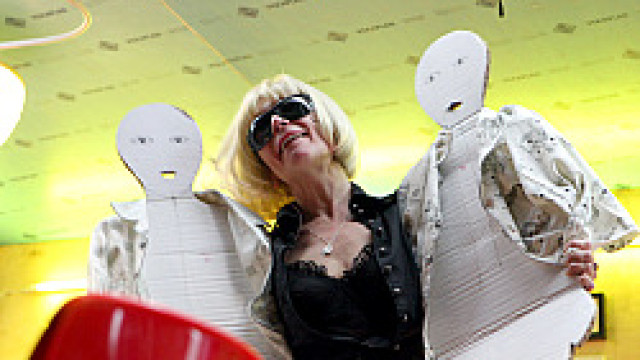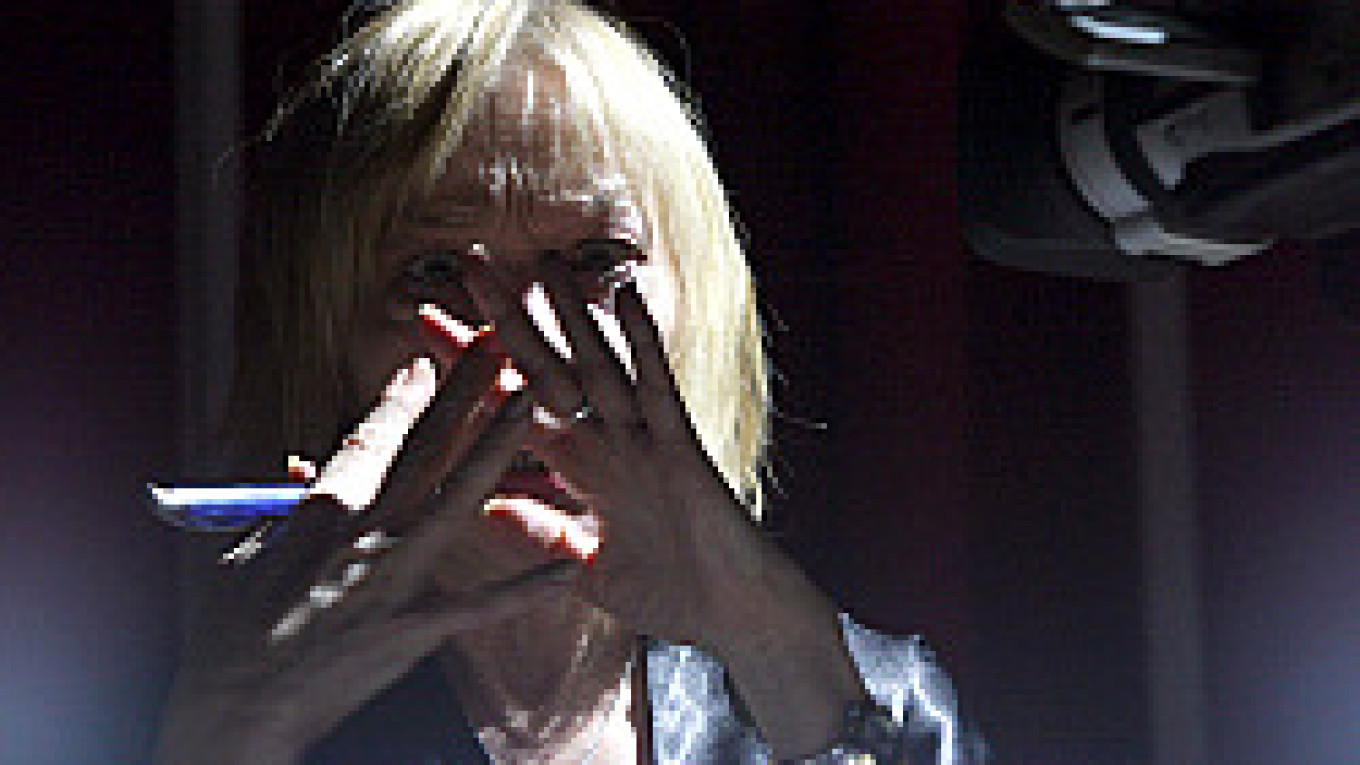Zholdak creates hot theater. His shows are loud and clamorous. They are fast-paced, occasionally threatening to lurch out of control. His actors often rattle off text so fast and furiously that they are difficult to follow. Garish colors and harshly shaded segments of black and white constantly keep the visual aspects of his shows in constant movement. In "Moscow. Psycho," a modern adaptation of the Medea myth, there is frequently a sense that we are witnessing someone on the verge of succumbing to nausea.
This can be unsettling. It is also brutally honest.
"Moscow. Psycho" is a multilayered production that piles images of pop culture, politics and personal distress one on top of the other. The Medea of this story, played with absolute fearlessness by Yelena Koreneva, is a contemporary housewife whose life is shattered when her husband Jason decides to leave her for a younger, more advantageous match, the daughter of local mafia head Creon. Creon is ready to give his backing to Jason if only he will just get rid of that awful wife.
The aesthetics of "Moscow. Psycho" are grounded in two seemingly exclusive styles ?€” the cool, super refined atmosphere of Alfred Hitchcock's cinematic masterpiece "Psycho" and the tawdry excesses of the Russian pop music world. It is no coincidence that Hitchcock's film is quoted in the show's title ?€” scenes from it run on a screen above the stage while scenes parallel take place on the stage. This also provides justification for two cameramen wandering the stage and providing live video feeds from various angles of everything that transpires. The live performance of "Moscow. Psycho" seems to flow out of the iconic images of Hitchcock's movie made in 1960.
The world of the performance, however, is characterized primarily by the self-indulgence and overkill of modern Russian pop culture. As Creon, the open-shirted, excessively bejeweled and morally deficient producer who is looking to set his daughter up with a hot item, Vladimir Shulga is chillingly, often humorously on target. One of his most powerful moments comes as a portrait of President Dmitry Medvedev is hung behind him while he rants semi coherently about patriotism and politics. Somehow, however, the portrait disappears almost without anyone noticing when Creon's golden-tongued speech of expedience is overtaken by more of the same old strong-arm tactics and crass manipulation of others.
A harbinger of this scene takes place early on when Medea shouts passionately and repeatedly, "Everybody is lying!" However, no one seems to pay her any mind.
Zholdak puts the self-satisfied world of pop culture at the heart of his show, turning the role of the ancient Greek Chorus over to a pink-haired, guitar-toting DJ (Alexei Gnilitsky). His monologues often break into the action or stop it altogether, taking on themes of love, sex and death. But while they often are delivered without irony or, at least, with genuine meaning behind them, they tend to be subsumed beneath the noise and the bling of everything going on around him ?€“ wild disco gyrations, over-the-top radio interviews and debauched parties.
 Vladimir Lupovskoy / For MT Yelena Koreneva is a force of nature as medea. | |
Zholdak, like few directors in Moscow today, imitates the crass world of the glossy myth without sinking to its level. He fills his stage with a teeming crowd of revelers, thugs, babes, bimbos and blatant liars and yet maintains distance from them at all times. This show is an attempt on his part to have his say about this familiar Russian social phenomenon; it never becomes a cheap exploitation of it.
One of the reasons this works so well is the acting. Shulga is razor sharp as the odious Creon. As his hapless daughter Creusa, Tatyana Tsirenina is the utter picture of a blank-headed, non comprehending innocent tossed into a world of madness. She has accepted all the clich??s of her age ?€“ lies, abuse of power, egotism and cynicism. These are the "values" of her generation; they are popular and they sustain her and her friends. Moreover, they were offered up to her by her father, a man who unmistakably loves her, and she has no reason to question them. Tsirenina is superb in this quietly conflicted role. Never suffering, never questioning, always seeking to see nothing but what she perceives to be the inevitability of her own happiness, her Creusa is a maddening, always attractive and ultimately tragic figure.
Ivan Mamonov's Jason is a recognizably spineless man of some sincerity and depth of feeling who, in the final analysis, puts the trappings of success ahead of all else. He is torn between his love for Medea and his infatuation with Creusa. Zholdak, with designer Tita Dimova, gives this crushing duality a physical presence in the show by having Jason race back and forth between the two rooms that split the stage approximately in half, one belonging to his wife, the other to his lover. As Jason jumps onto the star machine fueled by Creon, Medea often hangs around outside the door, calling to him in ways only he can hear. There is nothing admirable about Jason's erratic behavior, although his predicament is real and understandable.
Koreneva is a force of nature as Medea, the embodiment of the old addage that hell hath no fury like a woman scorned. Her portrait of Medea is the portrait of truth and justice mauled and maligned. At first she coaxes her man back to her, but when that does not succeed, she becomes threatening. This is enough to convince Creon to suggest she be killed, although Jason is never able to go that far. Nor is Creon, for Medea's powers of persuasion also work on him.
Over the course of the play the image strengthens of Medea as a marauding, enraged figure shadowing the corrupt and immoral people who have destroyed her home and hearth. Zholdak emphasizes this by increasingly broadcasting closeups of Medea's distorted, contorted facial expressions.
I'll provide no spoilers, but let me offer this vague note of alert: Zholdak used the basic myth of Medea as a starting point only. The two children, on whom Medea unleashes her wrath in most versions of the story, are here, although perhaps not in a way one would expect. As for the bloodletting we can find in works by writers from Euripides to Hitchcock ?€” that is here. To find out how that plays out, you'll have to go see this powerful and fearless production of "Moscow. Psycho."
"Moscow. Psycho" (Moskva. Psikho) plays Oct. 28 to 31 at 7 p.m. at the Contemporary Play School, located at 29/14 Neglinnaya Ulitsa. M. Trubnaya. Tel. 694-0756. www.neglinka29.ru. Running time: 2 hours, 45 minutes.
A Message from The Moscow Times:
Dear readers,
We are facing unprecedented challenges. Russia's Prosecutor General's Office has designated The Moscow Times as an "undesirable" organization, criminalizing our work and putting our staff at risk of prosecution. This follows our earlier unjust labeling as a "foreign agent."
These actions are direct attempts to silence independent journalism in Russia. The authorities claim our work "discredits the decisions of the Russian leadership." We see things differently: we strive to provide accurate, unbiased reporting on Russia.
We, the journalists of The Moscow Times, refuse to be silenced. But to continue our work, we need your help.
Your support, no matter how small, makes a world of difference. If you can, please support us monthly starting from just $2. It's quick to set up, and every contribution makes a significant impact.
By supporting The Moscow Times, you're defending open, independent journalism in the face of repression. Thank you for standing with us.
Remind me later.


